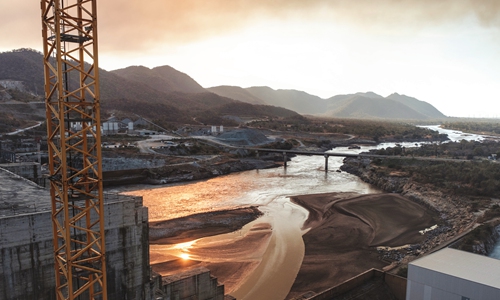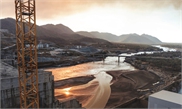
A general view of the Blue Nile River as it passes through the Grand Ethiopian Renaissance Dam, near Guba in Ethiopia, on December 26, 2019. Photo: AFP
Sudan said on Tuesday that the notification it received from Ethiopia over the second filling of a huge dam on the Nile River is useless without a negotiated deal among related countries.
"The Irrigation and Water Resources Ministry received a letter from its Ethiopian counterpart notifying it has started the second filling of the Grand Ethiopian Renaissance Dam (GERD) during the current rainy season," Omar Al-Farouq Sayed Kamel, spokesperson of the Sudanese government's team to the GERD talks, said in a statement.
Kamel expressed rejection of Addis Ababa's "unilateral move" which he described as a clear violation of the international law and stable exchange of benefits of common rivers.
The dam, which is set to be the largest hydroelectric power plant in Africa when completed, is the source of a decade-long diplomatic standoff between Ethiopia and downstream countries Sudan and Egypt.
The two downstream countries have referred the GERD issue to the United Nations Security Council, which is scheduled to convene a discussion on Thursday.
Ethiopia, which views the huge project as a big boost to its development, argues that adding water to the reservoir, especially during the rainy season in July and August, is a natural part of construction. However, Sudan and Egypt, which almost entirely rely on the river for freshwater, are worried about the dam's influence on their water supplies and security.
In February, Ethiopia said it would carry on with the second-phase 13.5-billion-cubic-meter filling of the GERD in June. The volume of the first-phase filling last year was 4.9 billion cubic meters.
The project, formerly known as the Millennium Dam, has been under construction since 2011. Its planned installed capacity is 6.45 gigawatts.

